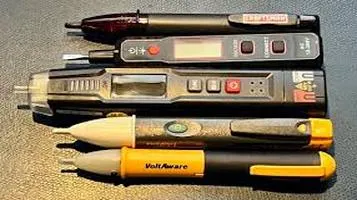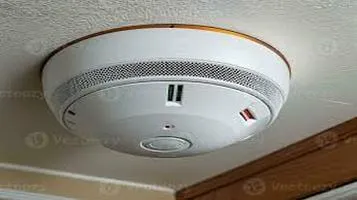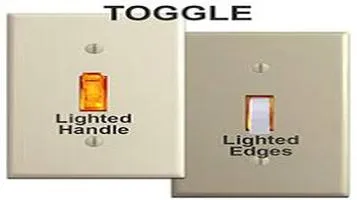Voltage Testers: An In-Depth Review
Voltage testers are essential tools used to detect the presence of electrical voltage in circuits and devices. These handy instruments are crucial for ensuring safety and accuracy in electrical work, allowing users to verify whether a circuit is live before proceeding with any maintenance or installation tasks. Voltage testers come in various forms, including non-contact voltage testers, which detect voltage through electromagnetic fields without physical contact, and contact voltage testers, which require direct contact with the conductor. They are used by electricians, technicians, and DIY enthusiasts alike to prevent electrical shocks and ensure compliance with safety standards. Modern voltage testers often feature LED indicators, audible alerts, or digital displays for easy and accurate readings, enhancing user convenience and confidence in electrical diagnostics.

Voltage testers are indispensable tools for anyone working with electrical systems, whether they are professional electricians, DIY enthusiasts, or homeowners performing routine maintenance. These devices help ensure safety by detecting the presence of voltage in electrical circuits, preventing potential electric shocks and other hazards. This review delves into the various types of voltage testers, their features, benefits, and some top models available in the market, providing a comprehensive guide for potential buyers.
Types of Voltage Testers
Voltage testers come in several varieties, each designed for specific applications:
1. Non-Contact Voltage Testers (NCVTs): These testers detect the presence of voltage without making direct contact with the electrical component. They are highly convenient and safe for quick checks. Non-contact testers, such as the Klein Tools NCVT-2, emit audible and visual alerts when voltage is detected, making them user-friendly and effective.
2. Contact Voltage Testers: These require direct contact with the electrical component. They are generally more accurate and can provide specific voltage measurements. An example is the Fluke T5-600 Continuity, Current, and Voltage Tester, which combines contact voltage testing with additional functions like continuity and current testing.
3. Multimeters: While primarily designed for measuring multiple electrical properties, multimeters often include voltage testing features. They provide detailed readings and are versatile tools for more advanced users. The Fluke 117 Electricians True RMS Multimeter is a popular choice, known for its reliability and precision.
4. Voltage Test Pens: These are compact and portable, similar to non-contact testers but usually require contact with the wire or outlet. They are handy for quick checks and are often used in household settings. The Sperry Instruments STK001 Non-Contact Voltage Tester Pen is a notable example, combining affordability with ease of use.
Key Features to Consider
When selecting a voltage tester, several key features should be taken into account:
- Voltage Range: The range of voltages the tester can detect is crucial. Ensure the tester can handle the voltages you expect to encounter. For household use, a range between 100V and 600V is typically sufficient, while industrial applications may require higher ranges.
- Safety Ratings: Look for testers with appropriate safety ratings, such as CAT (Category) ratings that indicate the tester's suitability for different environments and levels of electrical exposure. Higher CAT ratings (e.g., CAT IV) offer greater protection.
- Ease of Use: User-friendly designs, such as clear indicators (LED lights, beeps), ergonomic grips, and simple interfaces, enhance the usability of the tester. Non-contact testers, for example, often feature intuitive designs that make them accessible to non-professionals.
- Durability: A robust, well-constructed tester will withstand the rigors of daily use. Testers with rugged casings, drop resistance, and weatherproofing are ideal for professionals who work in demanding environments.
- Additional Functions: Some testers offer extra features like continuity testing, current measurement, or built-in flashlights, adding value and versatility. Multimeters, in particular, provide a wide range of functionalities beyond voltage testing.
Top Voltage Testers in the Market
1. Klein Tools NCVT-2: This non-contact voltage tester is a favorite among electricians for its reliability and ease of use. It features dual-range detection (12-48V AC and 48-1000V AC), a bright LED display, and an audible alarm. Its durable design and safety certifications (CAT IV 1000V) make it suitable for both residential and commercial applications.
2. Fluke T5-600: This versatile tool combines voltage, continuity, and current testing in one device. It offers precise measurements and a user-friendly interface. The T5-600 is built to last, with a rugged design and safety ratings up to CAT III 600V, making it ideal for professional use.
3. Sperry Instruments STK001: An affordable and straightforward option, this non-contact voltage tester pen is perfect for homeowners and DIY enthusiasts. It detects voltage from 50V to 1000V AC and features a convenient pocket clip, making it easy to carry around.
4. Fluke 117: As a premium multimeter, the Fluke 117 excels in accuracy and functionality. It includes non-contact voltage detection, true RMS for accurate measurements of non-linear loads, and a backlit display. It’s a bit pricier but worth the investment for serious professionals.
Conclusion
Voltage testers are essential tools for ensuring electrical safety and efficiency. Whether you need a simple non-contact tester for quick checks or a multifunctional multimeter for detailed diagnostics, there's a voltage tester to meet your needs. The Klein Tools NCVT-2 and Fluke T5-600 are top recommendations for their reliability and feature sets, while the Sperry Instruments STK001 offers great value for basic tasks. Ultimately, investing in a quality voltage tester not only enhances your work efficiency but also significantly improves safety, making it a wise choice for anyone dealing with electrical systems.






